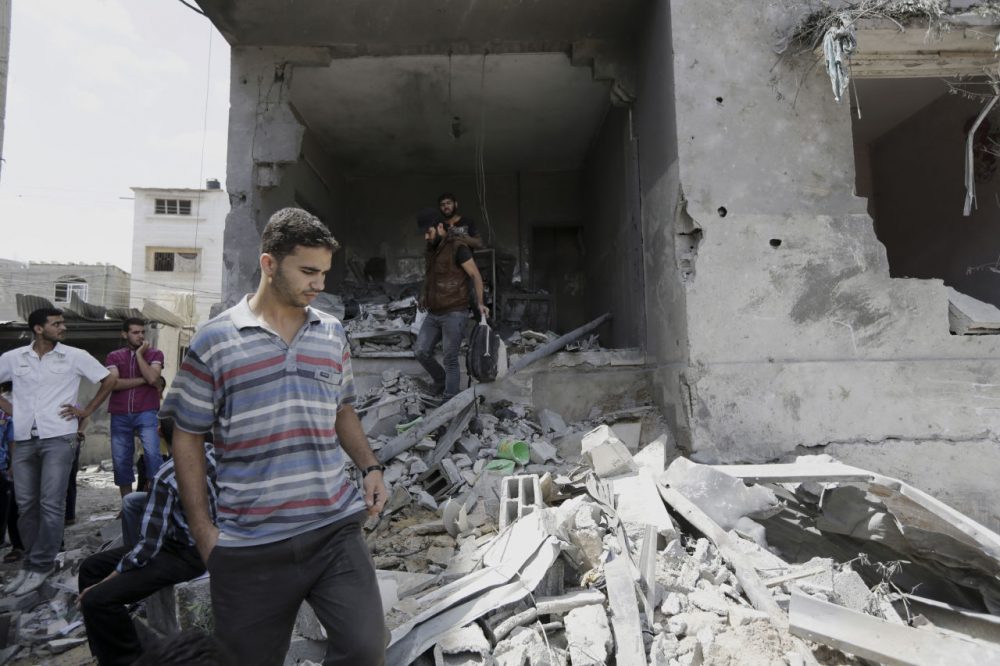Advertisement
Israel Calls For North Gaza Evacuation After Raid

Israel briefly deployed ground troops inside the Gaza Strip for the first time early Sunday as its military warned northern Gaza residents to evacuate their homes, part of a widening offensive that's killed more than 160 Palestinians.
Neither Israel nor Palestinian militants show signs of agreeing to a cease-fire, despite calls by the United Nations Security Council and others to end the increasingly bloody six-day offensive. With Israel massing tanks and soldiers at Gaza's borders, some fear that could signal a wider ground offensive that would cause heavy casualties.
"We don't know when the operation will end," Israeli Prime Minister Benjamin Netayahu told a Cabinet meeting Sunday. "It might take a long time."
Early Sunday, Israeli troops launched a brief raid into northern Gaza to destroy what it described as a rocket-launching site, an operation the military said left four soldiers slightly wounded.
The Israeli air force later dropped leaflets warning residents to evacuate their homes ahead of what Israel's military spokesman described as a "short and temporary" campaign against northern Gaza to begin sometime after 12 p.m. (0900 GMT). The area is home to at least 100,000 people.
It was not clear whether the attack would be confined to stepped-up airstrikes or whether it might include a sizeable ground offensive - something that Israel has so far been reluctant to undertake.
As the ultimatum drew near, hundreds fled Beit Lahiya, one of the communities the Israeli announcement affected. Some raced by in pickup trucks, waving white flags.
"They are sending warning messages," resident Mohammad Abu Halemah said. "Once we received the message, we felt scared to stay in our homes. We want to leave."

Ignoring international appeals for a cease-fire, Israel widened its range of Gaza bombing targets Saturday to include civilian institutions with suspected Hamas ties. One strike hit a center for the disabled, killing two patients and wounding four people. In a second attack, an Israeli warplane flattened the home of Gaza police chief Taysir al-Batsh and damaged a nearby mosque as evening prayers ended, killing at least 18 people, 17 of whom were al-Batsh family members. Fifty were wounded, including al-Batsh himself.
On Sunday, Palestinians with foreign passports began leaving Gaza through the Erez border crossing. Israel, which is cooperating in the evacuation, says 800 Palestinians living in Gaza have passports from countries including Australia, the United Kingdom and the U.S.
U.S. citizen Ahmed Mohana said he had mixed feelings about leaving friends and family behind in the troubled Gaza Strip.
"It is very hard, it is very tough," he said. "We are leaving our family, our relatives and brothers and sisters in this horrible situation -we have to do what we have to do."
Israel has launched more than 1,300 air strikes since the offensive began, military spokesman Lt. Col. Peter Lerner said Sunday. Palestinian militants have launched more than 800 rockets at Israel, including 130 in the last 24 hours, the Israeli military said Sunday. Several Israelis have been wounded, but there have been no fatalities.
Israel has said it's acting in self-defense against rockets that have disrupted life across much of the country. It also accuses Hamas of using Gaza's civilians as human shields by firing rockets from there.
Critics say Israel's heavy bombardment of one of the most densely populated territories in the world is itself the main factor putting civilians at risk.
The offensive marks the heaviest fighting since a similar eight-day campaign in November 2012 to stop Gaza rocket fire. The outbreak of violence follows the kidnappings and killings of three Israeli teenagers in the West Bank, the kidnapping and killing of a Palestinian teenager in an apparent revenge attack, and wide-ranging Israeli moves against Hamas militants and infrastructure in the West Bank.
Foreign diplomats also continued their efforts to end the bloodshed. German Foreign Minister Frank-Walter Steinmeier will fly to Israel for talks Monday and Tuesday with both the Israelis and the Palestinians. Meanwhile, the Arab League will meet Monday to discuss the offensive.